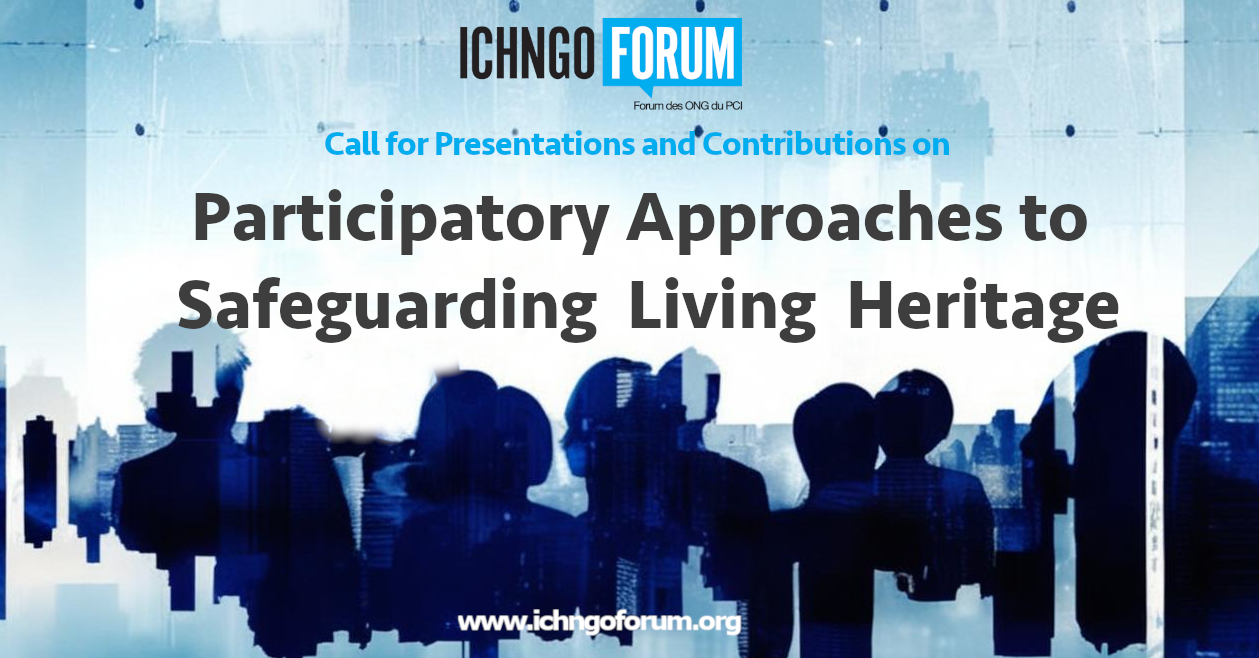
Participatory Approaches to Safeguarding Living Heritage
ICH NGO Forum Annual Symposium 2024 (In person and online)
Asuncion, Paraguay
Sunday, 1 December 2024
Open Call for Presentations and Contributions
Participatory Approaches to Safeguarding Living Heritage.
The 2024 Symposium of the ICH NGO Forum – on the occasion of the 19.COM meeting of the UNESCO 2003 Convention in Paraguay – will focus on community-based and participatory approaches to safeguarding living heritage. The involvement of communities, groups and individuals in safeguarding actions is widely regarded as one of the innovations of the 2003 Convention for the Safeguarding of Intangible Cultural Heritage compared to previous UNESCO heritage conventions. Recent international fora, such as the 2022 Mondiacult Declaration on Cultural Policies and Sustainable Development and the International Law Association’s 2022 Report on Participation in Global Heritage Governance, have further underlined the need for inclusive policies regarding the participation of local communities and non-governmental groups in heritage governance. A variety of methods have been developed by NGOs to engage communities. Yet, these haven’t been systematically researched or presented. This one-day hybrid symposium, co-organised with the Working Group Research as part of a new thematic area on participatory approaches to living heritage, will provide a space for sharing experiences on the participation of heritage communities, non-governmental groups and individuals in decisions and actions for safeguarding intangible heritage.
The ICH NGO Forum welcomes proposals for presentations at the symposium, to be submitted by 30 September 2024. Proposals of up to 250 words, accompanied by a 150 word bio are to be submitted to https://forms.gle/c6zaAYAYBbwCET5M9 and focus on one or more of the following topics:
- Research and documentation: community-initiated and community-driven activities, as well as various collaborations with members of local communities, which may include local researchers and fieldworkers, action-researchers/activists and citizen scientists, to identify and document community-based knowledge and practices.
- Heritage governance, networking and decision-making: tools and approaches, such as citizens’ assemblies, local councils, advisory groups, local consultants and volunteer associations that facilitate bottom-up approaches to heritage decisions.
- Transmission and education: community-based tools used at the grassroots level to transmit cultural knowledge and practices (including those using digital, information and communication technologies). These may include K-12 school based and youth programs occurring outside of schools.
- Communication, presentation, curation and dissemination: ways in which civil society organisations, cultural agencies and organisations, including museums, galleries, schools, archives, and libraries, facilitate community-based actions for safeguarding intangible heritage through co-curation, community-arts, inclusive collections research, and communication strategies.
Some questions to be considered by participants in the symposium:
- How is community participation interpreted, integrated and implemented in the work of your NGO? In which areas of safeguarding are communities, groups and individual custodians of living heritage you engage with mostly involved?
- How are ‘communities, groups and individuals’ defined in practice? What are the challenges in ensuring diversity, equity and inclusion when aiming for group participation and community representation that reflects diverse social classes, genders, generations and perspectives?
- Community participation can be difficult to define and measure. Sometimes it can be passive participation, where communities are objects of research, audiences, or recipients of knowledge about their culture. Other times, it includes active forms of participation, such as direct community consultation, community-led research and decision-making, or community-driven outreach and knowledge-transfer. What levels and ways of participation are most relevant in your work?
- Which methods, tools and media do you, or the communities/groups you work with, use to facilitate community participation in safeguarding living heritage? What are their benefits and limitations?
- How can we enable communities to represent and safeguard their living heritage on their own terms? Is there an approach you have found to be successful? What challenges or obstacles have you encountered and overcome? Were there projects or methods you have tried that did not work?
- Have you encountered disagreements and controversies in community-based, participatory work and projects? How were or could these be resolved?
Presentations of different formats are welcome. These can include current projects, plans for new community-based safeguarding actions, or past experiences. We are interested in examining cases of inspiring community-based and participatory safeguarding and governance practices, but also invite a reflection on the benefits, constraints and limitations of participatory work, power dynamics, shared authority and the logic and policies of heritage care, community empowerment and sustainability.
In addition to the Symposium, the proposals and presentations will also contribute to the development of a new thematic area for the Research Working Group on ‘Participatory and Community-Based Ways for Safeguarding Living Heritage’ and be included in an e-publication.
Proposal Submission Deadline: 30 September 2024
Notification of Acceptance: 21 October 2024
Organising Committee
Executive Board of the ICH NGO Forum in collaboration with the ICH NGO Forum Working Group Research
The Executive Board of the ICH NGO Forum
Western Europe and North America: Mr. Matti Hakamäki – Finnish Folk Music Institute (Finland) – Secretary
Eastern Europe: Ms. Tamara Nikolić Đerić – Association House of Batana (Croatia)
Latin America and the Caribbean: Ms. Irina Ruiz, Fundación INDICRI (Panama)
Asia and the Pacific: Ms. Cholponai Usubalieva-Grishuk – Aigine Cultural Research Center (Kyrgystan) – Treasurer
Africa: Mr. Bachirou Njoya, Fondation Princesse Momafon Rabiatou NJOYA, (Cameroon)
Arab States: Mr. Mohamed Lemine Beidieu – Association mauritanienne pour la sauvegarde du patrimoine culturel immatériel (Mauritania) – Vice President
International: Mr. Robert Baron – International Society for Ethnology and Folklore, President
The Working Group ICH NGOs and Research – Symposium 2024 team:
Marilena Alivizatou; Jana Ambrózová; Martin Andrade; Jorijn Neyrinck; Dafvid Hermansson; Valentina Lapiccirella Zingari; Jorijn Neyrinck; Joanne Orr; Carley Williams
Contact: Symposiumichngoforum@gmail.com

